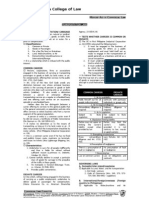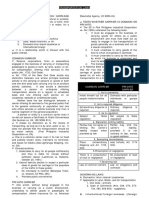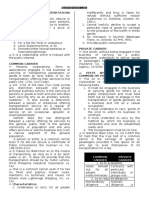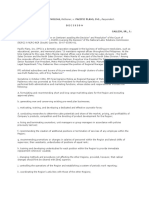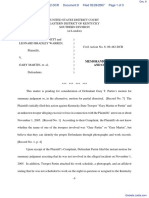Transportation Laws Upload1
Transportation Laws Upload1
Uploaded by
maanyag6685Copyright:
Available Formats
Transportation Laws Upload1
Transportation Laws Upload1
Uploaded by
maanyag6685Original Description:
Copyright
Available Formats
Share this document
Did you find this document useful?
Is this content inappropriate?
Copyright:
Available Formats
Transportation Laws Upload1
Transportation Laws Upload1
Uploaded by
maanyag6685Copyright:
Available Formats
San Beda College of Law
54
MEMORY AID IN COMMERCIAL LAW
TRANSPORTATION LAWS
COMMERCIAL LAW COMMITTEE
CHAIRPERSON: Garny Luisa Alegre ASST. CHAIRPERSON:Jayson O’S Ramos EDP: Beatrix I. Ramos SUBJECT
HEADS:
Marichelle De Vera (Negotiable Instruments Law); Jose Fernando Llave (Insurance); Aldrich Del Rosario
(Transportation Laws);
Shirley Mae Tabangcura, Bon Vincent Agustin (Corporation Law); Karl Steven Co (Special Laws); John Lemuel
Gatdula (Banking Laws); Robespierre CU (Law on Intellectual Property)
San Beda College of Law
55
MEMORY AID IN COMMERCIAL LAW
CONTRACT OF TRANSPORTATION/ CARRIAGE
A contract whereby a person, natural or juridical, obligates to transport persons, goods, or both, from one place to another, by
land, air or water, for a price or compensation.
Classifications:
1. Common or Private
2. Goods or Passengers
3. For a fee (for hire) or Gratuitous
4. Land, Water/maritime, or Air
5. Domestic/inter-island/coastwise or International/foreign
It is a relationship which is imbued with the public interest.
COMMON CARRIER
Persons, corporations, firms or associations engaged in the business of carrying or transporting passengers or goods or both, by
land, water, or air, for compensation, offering their services to the public (Art. 1732, Civil Code).
Art. 1732 of the New Civil Code avoids any distinction between one whose principal business activity is the carrying of persons or
goods or both and one who does such carrying only as an ancillary activity (sideline). It also avoids a distinction between a person
or enterprise offering transportation service on a regular or scheduled basis and one offering such service on an occasional, episodic
or unscheduled basis.
Neither does the law distinguish between a carrier offering its services to the general public that is the general community or
population and one who offers services or solicits business only from a narrow segment of the general population.
A person or entity is a common carrier even if he did not secure a Certificate of Public Convenience (De Guzman vs. CA, 168
SCRA 612).
It makes no distinction as to the means of transporting, as long as it is by land, water or air. It does not provide that the
transportation should be by motor vehicle. (First Philippine Industrial Corporation vs. CA)
One is a common carrier even if he has no fixed and publicly known route, maintains no terminals, and issues no tickets (Asia
Lighterage Shipping, Inc. vs. CA).
Characteristics:
1. Undertakes to carry for all people indifferently and thus is liable for refusal without sufficient reason (Lastimoso vs. Doliente,
October 20, 1961);
2. Cannot lawfully decline to accept a particular class of goods for carriage to the prejudice of the traffic in these goods;
3. No monopoly is favored (Batangas Trans. vs. Orlanes, 52 PHIL 455);
4. Provides public convenience.
PRIVATE CARRIER
One which, without being engaged in the business of carrying as a public employment, undertakes to deliver goods or
passengers for compensation. (Home Insurance Co. vs. American Steamship Agency, 23 SCRA 24)
TESTS WHETHER CARRIER IS COMMON OR PRIVATE:
The SC in First Philippine Industrial Corporation vs. CA (1995) reiterated the following tests:
1. It must be engaged in the business of carrying goods for others as a public employment and must hold itself out as ready
to engage in the transportation of goods generally as a business and not as a casual occupation;
2. It must undertake to carry goods of the kind to which its business in confined;
3. It must undertake to carry by the method by which his business is conducted and over its established roads; and
4. The transportation must be for hire.
In National Steel Corp. vs. CA (1997) the SC held that the true test of a common carrier is the carriage of goods or passengers
provided it has space for all who opt to avail themselves of its transportation for a fee.
COMMERCIAL LAW COMMITTEE
CHAIRPERSON: Garny Luisa Alegre ASST. CHAIRPERSON:Jayson O’S Ramos EDP: Beatrix I. Ramos SUBJECT HEADS:
Marichelle De Vera (Negotiable Instruments Law); Jose Fernando Llave (Insurance); Aldrich Del Rosario (Transportation Laws);
Shirley Mae Tabangcura, Bon Vincent Agustin (Corporation Law); Karl Steven Co (Special Laws); John Lemuel Gatdula (Banking
Laws); Robespierre CU (Law on Intellectual Property)
You might also like
- Sample Motion To Dismiss in ArkansasDocument3 pagesSample Motion To Dismiss in ArkansasCrystalFeier50% (2)
- Admiralty Law for the Maritime ProfessionalFrom EverandAdmiralty Law for the Maritime ProfessionalRating: 1 out of 5 stars1/5 (1)
- Transpo-Law Review (Aquino)Document25 pagesTranspo-Law Review (Aquino)Karlo Gonzalo Guibone Batac100% (4)
- Transportation Law Reviewer SAN BEDADocument39 pagesTransportation Law Reviewer SAN BEDARei Villarta100% (1)
- Transportation Law ReviewerDocument24 pagesTransportation Law ReviewerKelsey Olivar Mendoza100% (3)
- Reviewer On TransportationLawDocument34 pagesReviewer On TransportationLawlengjavier100% (2)
- My Sublease Agreement TemplateDocument7 pagesMy Sublease Agreement TemplateJeffery DawsonNo ratings yet
- Transportation Law Reviewer SAN BEDADocument43 pagesTransportation Law Reviewer SAN BEDAJade Lorenzo100% (3)
- San Beda College of Law: Contract of Transportation/ CarriageDocument41 pagesSan Beda College of Law: Contract of Transportation/ CarriageAimee HallNo ratings yet
- Transpo Mem AidDocument38 pagesTranspo Mem AidJoseph James JimenezNo ratings yet
- Transpo BedaDocument27 pagesTranspo Bedaazuka_devil6667485No ratings yet
- San Beda College of Law: 54 M A C LDocument25 pagesSan Beda College of Law: 54 M A C LEmmylou Francisco MagnoNo ratings yet
- San Beda College of Law: 54 M A C LDocument25 pagesSan Beda College of Law: 54 M A C LEiuol Nhoj ArraeugseNo ratings yet
- Transpo ReviewerDocument25 pagesTranspo Reviewernikka_tan2113No ratings yet
- Contract of TransportationDocument32 pagesContract of TransportationMaria Soledad MaramaraNo ratings yet
- Transportation Law 1Document25 pagesTransportation Law 1bulacanNo ratings yet
- San Beda College of Law Anthony Escasinas: 54 M A C LDocument24 pagesSan Beda College of Law Anthony Escasinas: 54 M A C LAnthony Rupac EscasinasNo ratings yet
- Law On TransportationDocument24 pagesLaw On TransportationBeyond GodlikeNo ratings yet
- Transportation Law ReviewerDocument25 pagesTransportation Law ReviewerJámie Lat100% (1)
- Transportation Law Reviewer PDFDocument25 pagesTransportation Law Reviewer PDFKris Antonnete DaleonNo ratings yet
- San Beda College of Law: Contract of Transportation/ CarriageDocument25 pagesSan Beda College of Law: Contract of Transportation/ CarriageMannyCabidoNo ratings yet
- Transportation Laws: Entralized AR PerationsDocument33 pagesTransportation Laws: Entralized AR Perationsdempearl2315No ratings yet
- Transpo PDFDocument25 pagesTranspo PDFCindy-chan DelfinNo ratings yet
- Transportation Law RevDocument25 pagesTransportation Law RevHani LawNo ratings yet
- San Beda College of Law: Contract OF Transportation/ CarriageDocument39 pagesSan Beda College of Law: Contract OF Transportation/ CarriagesonskiNo ratings yet
- Transpo BedaDocument27 pagesTranspo BedakevinbonaobraNo ratings yet
- San Beda College of Law: Emory Id in Ommercial AWDocument24 pagesSan Beda College of Law: Emory Id in Ommercial AWJOHAYNIENo ratings yet
- Beda Memaid TranspoDocument32 pagesBeda Memaid TranspoJAMP Internet CafeNo ratings yet
- Transportation Law PDFDocument24 pagesTransportation Law PDFMuli MJNo ratings yet
- Transpo Law ReviewerDocument24 pagesTranspo Law ReviewerPreAtty NygelNo ratings yet
- San Beda College of Law: Contract of Transportation/ CarriageDocument43 pagesSan Beda College of Law: Contract of Transportation/ CarriageCherry Jean RomanoNo ratings yet
- San Beda College of Law: Emory Id in Ommercial AWDocument24 pagesSan Beda College of Law: Emory Id in Ommercial AWJames Ibrahim AlihNo ratings yet
- Transpo Law Review AquinoDocument24 pagesTranspo Law Review AquinoWang BeauNo ratings yet
- Transpo Law ReviewerDocument25 pagesTranspo Law ReviewerKarl Mark Felizardo DayawonNo ratings yet
- Transpo MemaidDocument25 pagesTranspo MemaidejNo ratings yet
- Transportation LawsDocument125 pagesTransportation LawsDodong LamelaNo ratings yet
- Aid in Comm LawDocument33 pagesAid in Comm LawMiguel QuevedoNo ratings yet
- Commercial Law Memory Aid San Beda PDFDocument22 pagesCommercial Law Memory Aid San Beda PDFfrNo ratings yet
- Com Rev - Transpo LawDocument98 pagesCom Rev - Transpo LawMatthew WittNo ratings yet
- Transportation Law ReviewerDocument16 pagesTransportation Law ReviewerLawrence SantiagoNo ratings yet
- Transportation Law - BedaDocument31 pagesTransportation Law - BedaVim MalicayNo ratings yet
- San Beda College of Law: Contract of Transportation/ CarriageDocument39 pagesSan Beda College of Law: Contract of Transportation/ CarriageAnonymous cvFhSoNo ratings yet
- Transportation Law Reviewer SAN BEDADocument39 pagesTransportation Law Reviewer SAN BEDAJeorge Ryan MangubatNo ratings yet
- San Beda Transportation Law ReviewerDocument44 pagesSan Beda Transportation Law ReviewerJay Francis NodadoNo ratings yet
- Transportation Law Reviewer SAN BEDA PDFDocument38 pagesTransportation Law Reviewer SAN BEDA PDFxxsunflowerxxNo ratings yet
- San Beda College of Law: Contract of Transportation/ CarriageDocument43 pagesSan Beda College of Law: Contract of Transportation/ CarriageMae Jansen DoroneoNo ratings yet
- Transportation Consolidated LectureDocument99 pagesTransportation Consolidated LectureNanz JermaeNo ratings yet
- Transportation Law ReviewerDocument29 pagesTransportation Law ReviewerDONNIE RAY SOLONNo ratings yet
- Dokumen - Tips Transportation Law Reviewer San BedaDocument43 pagesDokumen - Tips Transportation Law Reviewer San BedaNathan PanisNo ratings yet
- Carriage of Persons, Luggage, or Goods Performed by Aircraft For RewardDocument20 pagesCarriage of Persons, Luggage, or Goods Performed by Aircraft For RewardDONNIE RAY SOLONNo ratings yet
- San Beda College of Law: Emory ID IN Ommercial AWDocument24 pagesSan Beda College of Law: Emory ID IN Ommercial AWJennilyn Gulfan YaseNo ratings yet
- Transportation LawDocument17 pagesTransportation LawPrincess Cue AragonNo ratings yet
- Dokumen - Tips - Transportation Law Reviewer San BedaDocument39 pagesDokumen - Tips - Transportation Law Reviewer San BedaMariane CayasNo ratings yet
- Negligence Without Fault: Trends Toward and Enterprise Liability for Insurable LossFrom EverandNegligence Without Fault: Trends Toward and Enterprise Liability for Insurable LossNo ratings yet
- Encyclopaedia of International Aviation Law: Volume 3 English and French Version Version Englaise Et Française 2013 EditionFrom EverandEncyclopaedia of International Aviation Law: Volume 3 English and French Version Version Englaise Et Française 2013 EditionNo ratings yet
- Constitution of the State of WyomingFrom EverandConstitution of the State of WyomingNo ratings yet
- The Rule of Lawyers: How the New Litigation Elite Threatens America's Rule of LawFrom EverandThe Rule of Lawyers: How the New Litigation Elite Threatens America's Rule of LawNo ratings yet
- Chanroblesv Irtua1awlibra RyDocument14 pagesChanroblesv Irtua1awlibra Rymaanyag6685No ratings yet
- Chanro Blesvirtua Llawlibra RyDocument7 pagesChanro Blesvirtua Llawlibra Rymaanyag6685No ratings yet
- Chanrobles Law Lib Rary: RedDocument5 pagesChanrobles Law Lib Rary: Redmaanyag6685No ratings yet
- Philippine National Construction Corporation v. NLRCDocument1 pagePhilippine National Construction Corporation v. NLRCmaanyag6685No ratings yet
- AGRIPINO V. MOLINA, Petitioner, v. PACIFIC PLANS, INC., Respondent. Decision Callejo, SR., J.Document12 pagesAGRIPINO V. MOLINA, Petitioner, v. PACIFIC PLANS, INC., Respondent. Decision Callejo, SR., J.maanyag6685No ratings yet
- (G.R. NO. 148105. July 22, 2004) Francisco Reyno, Petitioner, V. Manila Electric COMPANY, Respondent. Decision Sandoval-Gutierrez, J.Document12 pages(G.R. NO. 148105. July 22, 2004) Francisco Reyno, Petitioner, V. Manila Electric COMPANY, Respondent. Decision Sandoval-Gutierrez, J.maanyag6685No ratings yet
- Upload 3Document11 pagesUpload 3maanyag66850% (1)
- Upload 3Document1 pageUpload 3maanyag6685No ratings yet
- Upload 3Document1 pageUpload 3maanyag6685No ratings yet
- Bankard Employees Union vs. NLRCDocument1 pageBankard Employees Union vs. NLRCmaanyag6685No ratings yet
- Labor Advisory On Payment of Salaries Through AtmDocument1 pageLabor Advisory On Payment of Salaries Through Atmmaanyag6685No ratings yet
- Case Digest # VII-1 - GR No. 160073 - Barayoga V Asset Privatization Trust - PanganibanDocument1 pageCase Digest # VII-1 - GR No. 160073 - Barayoga V Asset Privatization Trust - Panganibanmaanyag6685No ratings yet
- G.R. NO. 140689. February 17, 2004Document1 pageG.R. NO. 140689. February 17, 2004maanyag6685No ratings yet
- Upload 6Document4 pagesUpload 6maanyag6685No ratings yet
- ISSUE: Whether or Not MERALCO Is The Employer of The Fired Security GuardsDocument1 pageISSUE: Whether or Not MERALCO Is The Employer of The Fired Security Guardsmaanyag6685No ratings yet
- Bankard Employees Union-Workers Alliance Trade Unions v. NLRCDocument1 pageBankard Employees Union-Workers Alliance Trade Unions v. NLRCmaanyag6685No ratings yet
- Union of Filipro Employees v. VivarDocument1 pageUnion of Filipro Employees v. Vivarmaanyag6685No ratings yet
- Cralaw Virtua1aw Lib RaryDocument1 pageCralaw Virtua1aw Lib Rarymaanyag6685No ratings yet
- Statement of ObjectivesDocument1 pageStatement of Objectivesmaanyag6685No ratings yet
- Case: Jose Rizal Colleges vs. NLRC: Labor Arbiter's DecisionDocument1 pageCase: Jose Rizal Colleges vs. NLRC: Labor Arbiter's Decisionmaanyag6685No ratings yet
- Certiorari: G.R. No. 144664 March 15, 2004Document1 pageCertiorari: G.R. No. 144664 March 15, 2004maanyag6685No ratings yet
- G.R. No. 114337 Nitto Enterprises NLRC and Roberto Capili First Division / Kapunan, J.: Daylo, Jerome Dela Cruz September 29, 1995 Series: 6Document1 pageG.R. No. 114337 Nitto Enterprises NLRC and Roberto Capili First Division / Kapunan, J.: Daylo, Jerome Dela Cruz September 29, 1995 Series: 6maanyag6685No ratings yet
- Upload 5Document1 pageUpload 5maanyag6685No ratings yet
- Upload 3Document8 pagesUpload 3maanyag6685No ratings yet
- Placewell International Services CorpDocument1 pagePlacewell International Services Corpmaanyag6685No ratings yet
- Cralaw Virtua1aw Lib RaryDocument1 pageCralaw Virtua1aw Lib Rarymaanyag6685No ratings yet
- Placewell International Services CorpDocument1 pagePlacewell International Services Corpmaanyag6685No ratings yet
- Article 38 of The Family Code HandoutDocument2 pagesArticle 38 of The Family Code HandoutMaan Delos SantosNo ratings yet
- Explain The Salient Features and Objective of Real Estate (Regulation and Development) Act. 2016?Document2 pagesExplain The Salient Features and Objective of Real Estate (Regulation and Development) Act. 2016?RohitNo ratings yet
- Cuerdo Vs Commission On Audit, 166 SCRA 657 Case Digest (Administrative Law)Document1 pageCuerdo Vs Commission On Audit, 166 SCRA 657 Case Digest (Administrative Law)AizaFerrerEbinaNo ratings yet
- The Chicago Convention On International Civil AviationDocument61 pagesThe Chicago Convention On International Civil AviationEzz OsamaNo ratings yet
- Victory+Liner+v +raceDocument2 pagesVictory+Liner+v +raceRégine Naldo0% (1)
- REQUIREMENTS Delayed RegistrationDocument2 pagesREQUIREMENTS Delayed RegistrationBobot Julius Ochamac AzeporoNo ratings yet
- Intra Moot-Plaintiff 1Document21 pagesIntra Moot-Plaintiff 1samidha hegdeNo ratings yet
- Annexure: Raghav Bahl Discloses Full Investments in London PropertyDocument2 pagesAnnexure: Raghav Bahl Discloses Full Investments in London PropertyThe Quint100% (1)
- Aquarela Do Brasil - BBDocument2 pagesAquarela Do Brasil - BBRobson VelasquesNo ratings yet
- 2024040365Document5 pages2024040365பூவை ஜெ ரூபன்சார்லஸ்No ratings yet
- Oscar Reyes Vs RTC of MakatiDocument2 pagesOscar Reyes Vs RTC of MakatiPaolo MendioroNo ratings yet
- Performance BondDocument3 pagesPerformance BondRocketLawyer100% (5)
- Syllabus - 2012-13 Civil Procedure (Avena)Document22 pagesSyllabus - 2012-13 Civil Procedure (Avena)Renz RuizNo ratings yet
- Burnett Et Al v. Martin Et Al - Document No. 8Document3 pagesBurnett Et Al v. Martin Et Al - Document No. 8Justia.comNo ratings yet
- Black Control of Black AffairsDocument3 pagesBlack Control of Black AffairsrijavecNo ratings yet
- 26-Geeslin v. Navarro A.C. No. 2033 May 9, 1990Document29 pages26-Geeslin v. Navarro A.C. No. 2033 May 9, 1990Noel IV T. BorromeoNo ratings yet
- Cang v. CA Case Digest (Special Proceedings)Document7 pagesCang v. CA Case Digest (Special Proceedings)Tan DaNo ratings yet
- Rep of The Phil Vs Philippine Resources Development CorporationDocument4 pagesRep of The Phil Vs Philippine Resources Development CorporationQueenie BoadoNo ratings yet
- Shang Vs ST FrancisDocument2 pagesShang Vs ST FrancisAnonymous 5MiN6I78I0No ratings yet
- Resolution No. 1Document3 pagesResolution No. 1University of St. La Salle Student SenateNo ratings yet
- Seizure CasesDocument76 pagesSeizure CasesFinally Home RescueNo ratings yet
- PlotsDocument8 pagesPlotsJayCharleysNo ratings yet
- Arts. 466-475 Accession To MovablesDocument8 pagesArts. 466-475 Accession To MovablesAyban NabatarNo ratings yet
- Alaska Mining Laws & Regulations BookletDocument76 pagesAlaska Mining Laws & Regulations BookletFrank MulchaeyNo ratings yet
- Rivera-Carrasquillo v. Calderon-Lozano, 1st Cir. (2016)Document48 pagesRivera-Carrasquillo v. Calderon-Lozano, 1st Cir. (2016)Scribd Government DocsNo ratings yet
- GRACIA KOWATO-second LetterDocument3 pagesGRACIA KOWATO-second LetterDahn UyNo ratings yet
- MistakeDocument11 pagesMistakejiajie chenNo ratings yet
- LTD Case DigestsDocument18 pagesLTD Case Digestsivory_beads100% (1)


















